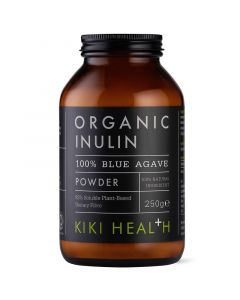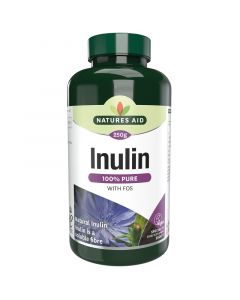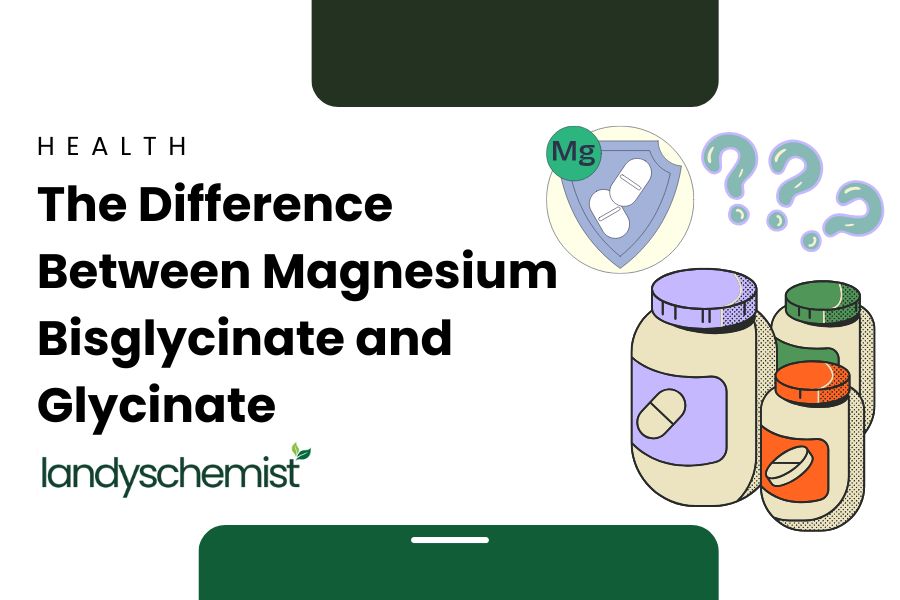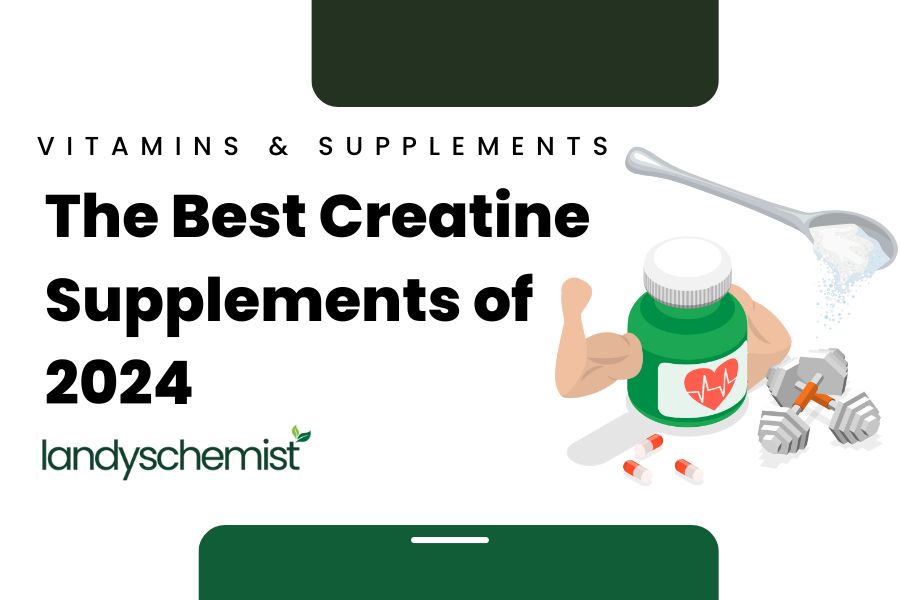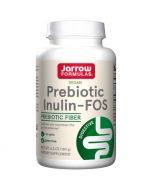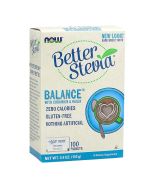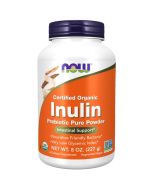
Your guide to: Inulin and its benefits
In the realm of nutrition, certain ingredients have a way of capturing our attention with their remarkable health benefits. The dietary fibre, inulin has proven itself to be a versatile and powerful food for promoting health.
In this blog, we will delve into the world of inulin and the ways it positively impacts our overall well-being. From enhancing gut health, to managing blood sugar levels, this humble ingredient has a lot to offer!
Inulin: What is it?
Inulin is a naturally occurring non-digestible carbohydrate and dietary fibre commonly derived from plants.
It is found abundantly in various plants, including chicory root, Jerusalem artichoke, dandelion root, and others. Inulin is a prebiotic , indicating its ability to support beneficial bacteria in the gastrointestinal tract.
How does Inulin Work?
Inulin is not digested by the body
As it is a fibre, it cannot be digested by the body, moving through the intestines intact through to the colon where it serves as a food source for the bacteria.
Fibre has a low caloric value but serves beneficial for good health. Inulin possesses a unique molecular structure characterized by β(2→1) fructan linkages, which human digestive enzymes cannot break down efficiently. As a result, inulin passes through the upper gastrointestinal tract largely undigested, reaching the colon intact.
Inulin as a prebiotic
Moreover, inulin's prebiotic nature promotes the growth of beneficial bacteria, such as Bifidobacterium and Lactobacilli, while inhibiting the proliferation of potentially harmful bacteria.
A study investigating the impact of inulin on gut microbiota composition revealed that inulin supplementation resulted in a significant increase in Bifidobacterium and Lactobacilli, indicating the selective stimulation of beneficial bacterial populations.
Inulin is fermented in the body
In the colon, inulin serves as a substrate for fermentation by the resident gut microbiota, leading to the production of short-chain fatty acids (SCFAs), predominantly acetate, propionate, and butyrate. This fermentation process is carried out by a group of bacteria which possess the necessary enzymes, such as inulinases and fructanases, to break down inulin into fermentable components.
Inulin produces Short Chain Fatty Acids (SCFA's)
The fermentation of inulin by gut bacteria results in the production of SCFAs. These SCFAs have diverse physiological effects, such as providing energy to cells within the colon, modulating immune function, reducing inflammation, and maintaining intestinal barrier integrity, playing a vital role in preventing the entry of harmful substances into the blood stream. This has been associated with enhanced nutrient absorption, weight management and blood sugar control.
Sources of Inulin
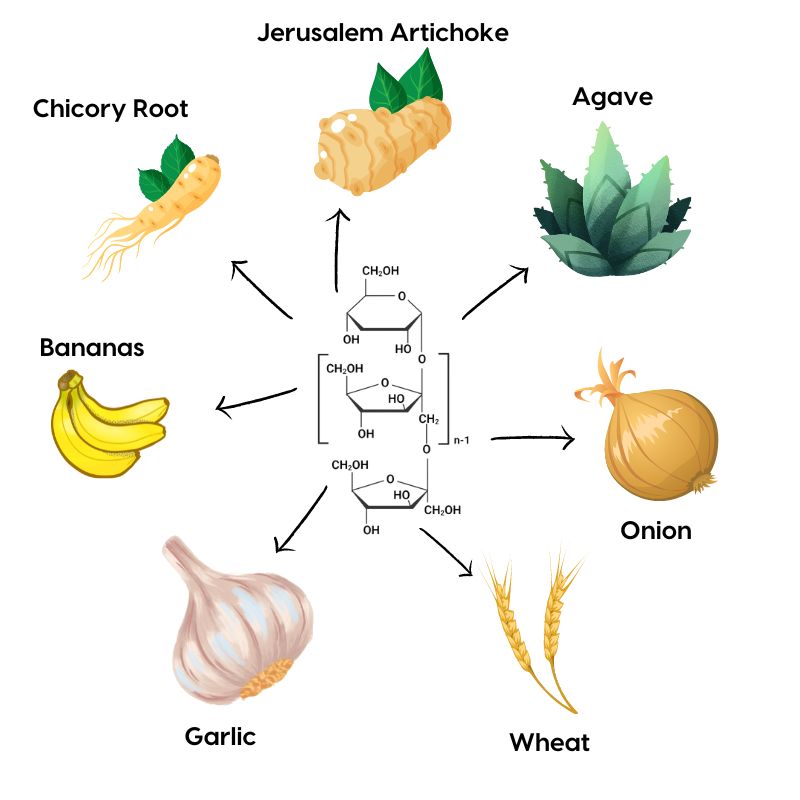
Inulin can naturally be found within foods such as chicory root, artichokes, agave, bananas, garlic, onions, and wheat. It can occur in 36,000 species of plants, however researches have said that Chicory root contains the highest source, making it commercially significant.
Jerusalem Artichoke is another notable plant that provides a substantial amount of inulin, primarily in its tuberous roots. Dandelion root is a commonly found plant rich in inulin. Additionally, certain species of agave, such as Agave tequilana (Blue Agave), contain significant amounts of inulin, making them popular choices in the food industry as natural sweeteners and sources of dietary fibre. As it has a creamy consistency it is often used as a fat substitute in foods and salad dressings as a lower fat alternative.
It can also be synthesised enzymatically from species such as Bacillus. Bacillus has been used to produce inulin on a larger scale. However higher molecular weight inulin is costly at a commercially available scale making plant-derived sources more popular.
Benefits of Inulin
Inulin for digestive health
Inulin aids digestion by increasing the population of good bacteria within the gut, particularly Bifidobacterium and Lactobacilli. They help to protect the beneficial bacteria from unwanted pathogens (bad bacteria) and help stimulate the immune system. It also downregulates the expression of pro-inflammatory cytokines which are involved in inflammatory responses and what can cause pathological pain.
These bacteria ferment inulin into SCFAs which provide an energy source for colonocytes, the cells lining the colon. Thereby promoting their health and function by maintaining tight junctions, enhancing nutrient absorption like sodium and calcium, and regulation of pH. By regulating the pH of the colon, the environment created helps inhibit the growth of harmful bacteria whilst improving the integrity of the gut barrier, reducing inflammation in the digestive tract.
Inulin for bowel health
Inulin also increases the bulk and softness of stools and alleviates constipation. Inulin increases the frequency of bowel movements, whilst slowing down overall digestion meaning that the body can absorb nutrients better from the food that is eaten. A 2019 study found that daily intake of 10g of inulin derived from chicory root helped with mild, chronic constipation in middle-aged participants.
Inulin for cardiovascular health
Research has shown that inulin can help the body absorb calcium better which is useful for a stronger skeletal system and maintaining strong bones. This can help reduce the risk of osteoporosis. SCFAs play a crucial role in enhancing calcium absorption by promoting the expression of calcium-binding proteins and transporters in the intestinal cells. For example, butyrate stimulates the production of calcitriol, the active form of vitamin D, which is necessary for efficient calcium absorption.
The benefit of good calcium absorption is that it can help regulate blood vessels and help prevent levels of high blood pressure. This is because calcium can bind fatty acids, and so it can decrease the absorption of lipids, and lower cardiovascular disease risk. There have also been several studies to indicate that lower calcium intakes can correlate to hypertension and atherosclerosis (where the arteries narrow, restricting blood flow).
Inulin for weight Loss
Inulin makes you feel full and reduces the absorption of cholesterol as it passes through the digestive tract. As a result, you may experience a reduced appetite. Some research has suggested that it can make a good weight management aid.
In 2013, a study examined the effects of inulin consumption on appetite and energy intake. The study involved 65 healthy adults who were divided into two groups. One group received probiotic yogurt supplemented with 4g of inulin, while the other group consumed yogurt without any pre- or probiotic properties. The findings of the study revealed that the group consuming yogurt with inulin experienced a significant reduction in calorie intake compared to the control group. This outcome underscores the appetite-suppressing effect of inulin. The inclusion of inulin in the probiotic yogurt contributed to a decreased overall energy intake, suggesting its potential as a dietary aid in managing appetite and weight.
Interestingly, there has been research published showing that daily inulin helps to decrease fat around the liver and improves liver function in those suffering from NAFLD (non-alcoholic fatty liver disease). This was seen over the course of 6 months in 102 men and women who received probiotic yoghurt with 1.5g of inulin. Butyrate was also found to decrease adipose tissue (body fat) mass, increase lipolysis (breakdown of stored fat), and decrease inflammation.
Inulin to regulate blood sugar levels
Inulin forms a gel-like substance which delays the breakdown of complex carbohydrates into simple sugars like glucose. This means that the release of glucose into the bloodstream occurs more gradually, preventing spikes in sugar levels. Additionally, due to its resistance to digestion, inulin has a low glycaemic index, meaning that it does not cause blood glucose levels to spike dramatically.
Studies have shown that when inulin is present in the diet for a prolonged period, it may be beneficial for those who are prediabetic as inulin can potentially stabilise blood sugar levels. One mechanism by which inulin helps regulate blood sugar is by stimulating the release of incretin hormones, specifically glucagon-like peptide-1 (GLP-1). GLP-1 acts on pancreatic cells, increasing insulin secretion and reducing glucagon release, ultimately leading to better glucose control.
How to take inulin
Inulin, being low in calories, high in fibre and vegetarian and vegan friendly offers a host of health benefits and are easy to incorporate into the daily diet.
It is available as supplements or as a powder which can be dissolved into drinks or sprinkled over food. European consumption of inulin appears to be around 3-11g a day. Inulin is also safe for infant nutrition but you should always consult with a medical professional before taking any sort of supplement.
How long does it take for inulin to work
A study showed that after just 8 weeks, those taking insulin saw improvements in markers for inflammation and glucose metabolism, however it may take between 3-6 months to see lasting improvements to digestion and reduced cholesterol levels.
How long does inulin stay in your system
The exact time it takes for inulin to be eliminated from the system is difficult to determine precisely. However, it is estimated that most of the inulin is metabolised and excreted within 24 to 48 hours after ingestion. Some residual SCFAs may continue to be produced and utilized for a longer duration.
It is important to note that inulin is a soluble fibre, and its effects on gut health and blood sugar regulation are primarily attributed to its fermentation by gut bacteria rather than its direct presence in the system. Therefore, the benefits associated with inulin consumption may persist even after its elimination from the body, as the positive changes in gut microbiota can have longer-term effects on overall health.
Product Recommendations
Derived from 100% organic Mexican blue agave plant, this plant-based fibre has a neutral flavour with a 93% soluble texture. It helps maintain a healthy gut to aid with digestion and nutrient absorption.
This powder uses inulin extracted from chicory which can be added to any food or drink to help support gut health.
Summary
- Inulin is a soluble fibre which is not digested in the stomach, but instead acts as a prebiotic for beneficial bacteria like Bifidobacterium to grow.
- Inulin can be found in a wide variety of plants, fruits and vegetables with the highest source from the Chicory Plant.
- Inulin is fermented by bacteria to form Short Chain Fatty Acids which have beneficial effects on the body including blood sugar management, and aid digestion.
By Saarah Mengrani, MSc Biotechnology

